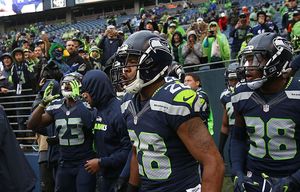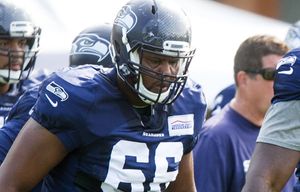He helped launch an American fashion trend, guided an iconic but flailing footwear company to find its cool again, and worked to establish Seattle as a bastion of professional sports.
But beyond all his business accomplishments and civic contributions, Walter E. Schoenfeld’s true character was found in his inherent decency and unflagging optimism that drew people to his side for counsel and camaraderie, his friends and family members say.
“The respect he had for people was unbelievable,” said Lenny Wilkens, a Hall of Fame NBA player and coach who counted himself among Mr. Schoenfeld’s longtime friends. “I’m a better person for knowing Walter and this city is a better place because of him.”
Mr. Schoenfeld, the founder of the quintessential 1970s designer-jeans company Brittania Sportswear, a former chief executive and president of Vans, and a founding partner of three Seattle professional-sports teams — the SuperSonics, the Mariners and the Sounders — died Thursday after a two-year battle with cancer. He was 84.
Born in Seattle on Nov. 6, 1930, Mr. Schoenfeld was the son of Edna and Max Schoenfeld, a German immigrant who helped found a clothing-manufacturing empire in Seattle. Walter Schoenfeld graduated from Garfield High School and attended the University of Southern California before graduating from the University of Washington in 1952.
After serving as an Army lieutenant in the Korean War, Mr. Schoenfeld returned to Seattle in 1955 to work with his father. He soon met and married Esther Behar, and together they had three children.
In 1971, Mr. Schoenfeld moved his family to London to build a necktie factory in Scotland. London’s flair for fashion soon caught his attention and sparked an idea.
“He first started seeing this idea for fashionable denim on Carnaby Street,” his son, Jeff Schoenfeld, recalled. “People were wearing fashionable jeans and my dad thought here was this kind of this cool new trend, and he ran with it.”
Schoenfeld returned to Seattle and in 1973 launched Brittania Sportswear, a company that manufactured designer jeans as an alternative to Levi’s and other plain denim brands. In less than a decade, Brittania fielded a team of 50 designers and 400 employees in Seattle, selling 30 million pairs of jeans annually.
“It was the first of all those fashion-jeans companies that got big in the 1970s and ’80s,” Jeff Schoenfeld said. “Brittania was the start of the denim revolution.”
Mr. Schoenfeld’s passion for business was rivaled by his sense of civic pride, friends and family say. In 1967, he partnered with an ownership group led by Sam Schulman that brought pro basketball to town with the expansion SuperSonics, Seattle’s first major league sports franchise of the modern era.
Mr. Schoenfeld later joined another ownership group to bring the North American Soccer League to Seattle with the first incarnation of the Sounders in 1974. Three years later, he was among six founding partners to bring Major League Baseball back to Seattle, with the Mariners.
“It was never his goal to be a big, recognized sports owner,” Jeff Schoenfeld said. “My dad always thought Seattle should be a major, world-class city, and he was certain that professional sports was a big part of doing that.”
Mr. Schoenfeld’s ventures in sports-team ownership created lasting alliances with coaches and players, including Wilkens, who struck a friendship with Mr. Schoenfeld soon after being traded to Seattle in 1969.
When Wilkens coached the Sonics to the 1978-79 NBA championship, Mr. Schoenfeld, the team’s vice president and director, served as a behind-the-scenes mentor, Wilkens said.
“Sam (Schulman) was always out front, but Walter was always there to offer support,” Wilkens said. “Here’s a guy that even under the pressure of doing business globally was always calm and under control, and I thought, `That’s the way to be.’ When you’re around people like that, they have an influence.”
In the mid-1990s, Mr. Schoenfeld’s business ties led him to the board of directors of Vans, the California-based footwear company known for its rubber-soled canvas loafers popularized by skateboarding culture and the 1982 movie “Fast Times at Ridgemont High.” But by then, the company that had once manufactured a national fad had hit bottom.
Then in his 60s, Mr. Schoenfeld hardly seemed like the change agent for a skater-shoe firm catering to the youth demographic. But the company quickly named him CEO and president, and over 13 years leading Vans with his son Gary, the company returned to prominence.
“At the time, Forbes ran an article about Dad calling him the ‘Grandpa of Grunge,’ ” Jeff Schoenfeld said. “Even at that age, he got it. He made Vans cool again.”
Vans was eventually sold to VF Corp. a $12 billion apparel powerhouse that owns such brands as The North Face and Wrangler.
Mr. Schoenfeld also served on numerous public and private boards, including the Barbara Sinatra Children’s Center for abused children; participated on a monthly council with President Jimmy Carter; attended the signing of the Camp David peace accords in 1978; and co-hosted Chinese leader Deng Xiaoping’s visit to Seattle in 1979.
He is survived by his wife, Esther; his children, Lea Anne, Jeff and Gary, and their respective spouses, Randy Ottinger, Julie Schoenfeld and Michelle Schoenfeld; and eight grandchildren.
A memorial is planned for noon on Sunday, Aug. 16, at Temple De Hirsch Sinai in Seattle, followed by burial at the Sephardic Brotherhood cemetery. Family members request those wishing to honor Mr. Schoenfeld to make donations in his memory to UW Medicine, the Seattle Cancer Care Alliance or any charity helping those in need.








